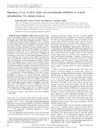Please use this identifier to cite or link to this item:
https://accedacris.ulpgc.es/jspui/handle/10553/75933
| Title: | Opposing effects of nitric oxide and prostaglandin inhibition on muscle mitochondrial Vo 2 during exercise | Authors: | Boushel, Robert Fuentes, Teresa Hellsten, Ylva Saltin, Bengt |
UNESCO Clasification: | 241106 Fisiología del ejercicio | Keywords: | Contraction Indomethacin NG-Monomethyl-L-Arginine OXPHOS Oxygen Uptake |
Issue Date: | 2012 | Journal: | American Journal of Physiology - Regulatory Integrative and Comparative Physiology | Abstract: | Nitric oxide (NO) and prostaglandins (PG) together play a role in regulating blood flow during exercise. NO also regulates mitochondrial oxygen consumption through competitive binding to cytochrome-c oxidase. Indomethacin uncouples and inhibits the electron transport chain in a concentration-dependent manner, and thus, inhibition of NO and PG synthesis may regulate both muscle oxygen delivery and utilization. The purpose of this study was to examine the independent and combined effects of NO and PG synthesis blockade (L-NMMA and indomethacin, respectively) on mitochondrial respiration in human muscle following knee extension exercise (KEE). Specifically, this study examined the physiological effect of NO, and the pharmacological effect of indomethacin, on muscle mitochondrial function. Consistent with their mechanism of action, we hypothesized that inhibition of nitric oxide synthase (NOS) and PG synthesis would have opposite effects on muscle mitochondrial respiration. Mitochondrial respiration was measured ex vivo by high-resolution respirometry in saponin-permeabilized fibers following 6 min KEE in control (CON; n = 8), arterial infusion of N G-monomethyl-L-arginine (L-NMMA; n = 4) and Indo (n = 4) followed by combined inhibition of NOS and PG synthesis (L-NMMA + Indo, n = 8). ADP-stimulated state 3 respiration (OXPHOS) with substrates for complex I (glutamate, malate) was reduced 50% by Indo. State 3 O 2 flux with complex I and II substrates was reduced less with both Indo (20%) and L-NMMA + Indo (15%) compared with CON. The results indicate that indomethacin reduces state 3 mitochondrial respiration primarily at complex I of the respiratory chain, while blockade of NOS by L-NMMA counteracts the inhibition by Indo. This effect on muscle mitochondria, in concert with a reduction of blood flow accounts for in vivo changes in muscle O 2 consumption during combined blockade of NOS and PG synthesis. | URI: | https://accedacris.ulpgc.es/handle/10553/75933 | ISSN: | 0363-6119 | DOI: | 10.1152/ajpregu.00044.2012 | Source: | American Journal of Physiology - Regulatory Integrative and Comparative Physiology [ISSN 0363-6119], v. 303 (1), R94–R100, (Julio 2012) |
| Appears in Collections: | Artículos |
SCOPUSTM
Citations
16
checked on Jun 8, 2025
WEB OF SCIENCETM
Citations
18
checked on Jun 8, 2025
Page view(s)
142
checked on Dec 14, 2024
Download(s)
272
checked on Dec 14, 2024
Google ScholarTM
Check
Altmetric
Share
Export metadata
Items in accedaCRIS are protected by copyright, with all rights reserved, unless otherwise indicated.
